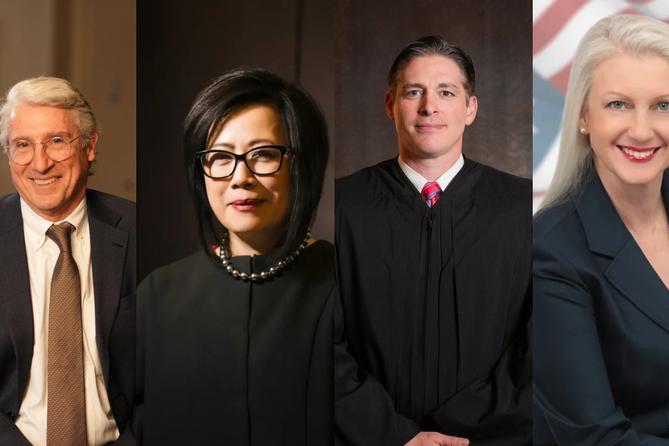HARRISBURG — On Nov. 4, voters across Pennsylvania will fill vacancies on Commonwealth Court and Superior Court.
Pennsylvania’s two intermediate appellate courts have the power to affirm or reverse decisions made in lower courts. Their rulings can be appealed to the state Supreme Court, Pennsylvania’s court of last resort.
Each court serves a distinct role within the commonwealth’s legal system.
Commonwealth Court presides over civil actions brought by and against the Pennsylvania state government and hears appeals primarily in cases involving state departments and local governments. Superior Court handles criminal, family, and civil cases that are appealed by county Courts of Common Pleas.
The person who wins the open seat on Commonwealth Court could help shape Pennsylvania’s laws on everything from elections to firearms, while the candidate who wins a seat on Superior Court could help decide the outcomes of high-profile criminal cases.
Judges on both courts are also often top candidates to fill openings on the Pennsylvania Supreme Court.
Pennsylvania is one of a handful of states that elect judges in partisan contests, meaning candidates run under the banner of a political party, collect endorsements, and raise money.
There are a few key differences between a judicial election and other political elections in the commonwealth, however. Prospective judges can’t directly ask for donations, though their campaign committees can. They also can’t make promises that they’ll rule in certain ways.
For those reasons, ratings from the Pennsylvania Bar Association can be important. The bar ranks candidates as “highly recommended,” “recommended,” or “not recommended” based on their judicial records and interviews with a judicial evaluation commission.
Spotlight PA has noted these rankings, as well as other key details, in its profiles of the candidates:
Commonwealth Court
The nine-member Commonwealth Court is the first stop for many high-profile cases.
Notable recent rulings include a 2023 opinion that found the state’s education funding system violated the rights of parents and students in poorer school districts, and a 2024 decision that mail ballots shouldn’t be rejected for missing dates (the state Supreme Court later overturned that decision).
In March 2025, the court decided a lawsuit brought by Spotlight PA, ruling that emails and other communications between Pennsylvania lawmakers and the lobbyists who try to influence them can remain hidden from the public.
Judges serve initial 10-year terms, then face a nonpartisan retention vote, which usually succeeds.
There is one seat open on Commonwealth Court this year.
The court currently has five judges who were elected as Republicans and three elected as Democrats. This election will fill the seat of Ellen Ceisler, who was elected as a Democrat and retired in January.
The mandatory retirement age for Pennsylvania’s judges is 75.
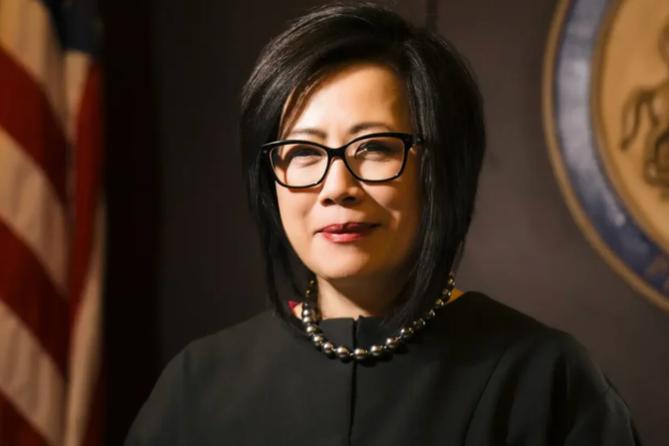
Democratic candidate: Stella Tsai
Tsai has served as a judge on Philadelphia’s Court of Common Pleas since 2016. She was first appointed, then elected to a 10-year term the following year. In her campaign materials, she says that she has worked across the city’s criminal, civil, orphans’ court, and family court divisions.
From 2000 to 2003, Tsai worked as chair of administrative law in Philadelphia’s law department, managing child welfare and social services attorneys.
After that, she left the city for a period and became a business litigation partner at the firm Archer & Greiner. Her profile on the website for the University of Pennsylvania's Carey Law School, where she is an adjunct professor, notes that she concentrated on “regulatory compliance, land use, and ethics” during her time at the firm.
Tsai says on her campaign website that she has “volunteered to safeguard voting rights, immigrant rights, and civil rights.” She previously served as president of the Asian Pacific American Bar Association of Pennsylvania and in various official capacities with the Pennsylvania Bar Association.
She has been making stops across the state as part of her campaign, in recent weeks visiting an Italian festival in Scranton, a barbecue in Philadelphia, and the Crawford County Fair.
And while, like other judicial candidates, she avoids talking about how she’d rule on specific Commonwealth Court cases, she has nodded at her political values.
In accepting a nomination from Planned Parenthood Pennsylvania Advocates, for instance, Tsai posted on Facebook, “We have seen in recent years that reproductive healthcare rights are often determined by the courts. I am incredibly proud to receive the support and endorsement of PP Pennsylvania Advocates in the race for Commonwealth Court!”
She has also recently highlighted endorsements from the Conservation Voters of Pennsylvania and the educators’ union PSEA-PACE.
The state Democratic Committee has endorsed Tsai’s candidacy.
The Pennsylvania Bar Association rated her as “highly recommended,” saying she has “a long and diverse legal career” with extensive trial experience in state and federal courts, and that she is respected among fellow judges and considered “enthusiastic, hard-working and fair.”
Read Tsai’s answers to the PBA questionnaire here.
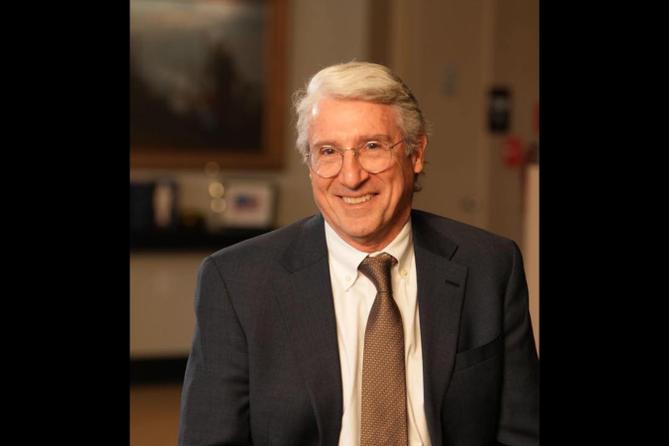
Republican candidate: Matthew Wolford
Wolford is a solo practitioner based in Erie and specializes in environmental law, though he has also worked in state government in the past.
On his campaign website, he describes his practice as focusing partially on “defending clients against government enforcement actions and helping clients work through complex regulatory challenges,” and partly on “fighting for private property rights,” which includes taking on disputes over zoning and easements, and with homeowners’ associations.
Before starting his practice, Wolford was an attorney for the Department of Environmental Protection, and before that a deputy state attorney general, supervising the environmental crimes section regional field office in Meadville. He also worked as a special prosecutor for the attorney general’s office and the U.S. attorney for the Western District of Pennsylvania.
Like Tsai, his campaigning heated up over the summer, and he most recently made appearances at the Wyoming County Fair, the Sullivan County Fair, and StroudFest in Monroe County. And in a sign that campaign operatives in both parties consider Lackawanna County to be up for grabs, Wolford, like Tsai, was at Scranton’s Italian Festival.
Wolford’s campaign has repeatedly stressed that he “will not legislate from the bench,” and noted that he “is running for Judge of the Commonwealth Court because he is concerned about government over-regulation and overreach.”
Wolford is endorsed by the Pennsylvania Republican Party.
The Pennsylvania Bar Association noted in its assessment of Wolford that his other professional activities include a longtime adjunct professorship at Erie’s Gannon University, and he is “active in the bar association and community organizations.”
The PBA rated Wolford as “highly recommended,” noting that he has been “litigating all aspects of environmental law,” both civilly and criminally and at trial and appellate levels, for almost four decades.
Wolford is “highly regarded for his work ethic, preparation, common sense, fairness, integrity, prompt and efficient performance and legal expertise in the environmental area,” the association wrote.
Read Wolford’s answers to the PBA questionnaire here.
Superior Court
The 15-member Superior Court handles criminal and civil cases that don’t involve the government.
The panel’s main role is to review lower courts’ verdicts. Notable recent decisions include a 2019 opinion tossing out rapper Meek Mill’s conviction on drug and gun charges. Judges serve initial 10-year terms, then face nonpartisan retention votes, which usually succeed.
One seat on Superior Court has been open since Judge Daniel McCaffery was elected as a Democrat to the state Supreme Court in 2023.
The court currently has eight judges elected as Democrats and six Republicans. Its president judge, Democrat Anne Lazarus, was selected through a vote by members of the court and serves a five-year term in that role.
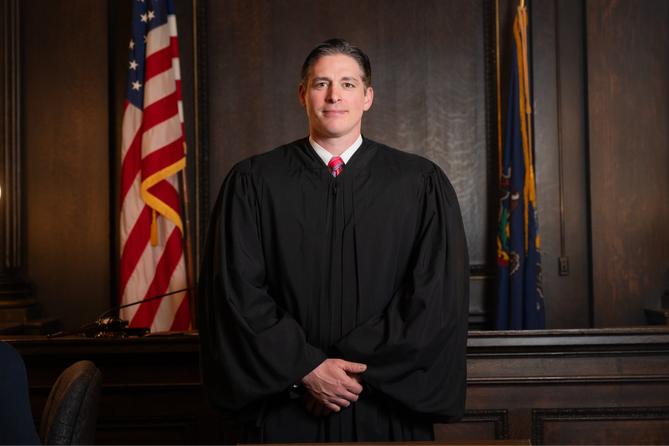
Democratic candidate: Brandon P. Neuman
Neuman, of Washington County, has served as a judge on the county’s Court of Common Pleas since 2018. He was a member of the state House of Representatives from 2011 to 2017.
As a judge, Neuman primarily presides over civil court and a veteran’s specialty court, according to his campaign website, and has also presided over criminal and family law cases.
Last year, Neuman handed down a notable ruling that ordered Washington County to notify voters if their mail ballots have errors that would keep them from being counted, so that those voters would be able to cast provisional ballots.
During his time in the legislature, one of Neuman’s biggest accomplishments was a successful 2015 law that sped up the processing of rape kits, which was aimed at addressing a major backlog Pennsylvania had at the time.
Before his time in Harrisburg, Neuman was a trial lawyer and handled “complex civil litigation and representing victims who have been neglected or abused in nursing homes,” his campaign website says.
His most recent campaign stops have been to a Philly barbecue alongside other judicial candidates, Pittsburgh’s Labor Day parade, and the Schuylkill County Democratic Picnic.
He’s been promoting endorsements from unions like the Pennsylvania Laborers' District Council, as well as from law enforcement groups that don’t always back Democrats — the Fraternal Order of Police, the State Troopers Association, and the Sheriffs’ Association.
Neuman is “highly recommended” by the Pennsylvania Bar Association, which said his “opinions demonstrate knowledge of substantive and procedural legal issues and the ability to provide good factual backgrounds and well-developed legal arguments.” The association added that Neuman’s colleagues believe he has high integrity, a good judicial temperament, and “treats all individuals fairly,” among other positive attributes.
You can read Neuman’s answers to the PBA questionnaire here.
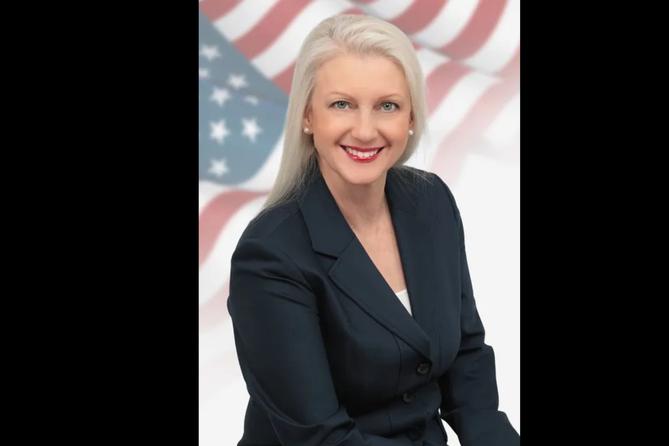
Republican candidate: Maria Battista
A Clarion County resident, Battista previously served as assistant general counsel for the Pennsylvania Departments of Health and State under former Govs. Tom Corbett, a Republican, and Tom Wolf, a Democrat.
She also was a prosecutor in Franklin and Venango Counties, and was a contract specialist for the Department of Defense.
Battista ran unsuccessfully for Superior Court in 2023. She is currently president at Judge Government Services, a consulting firm.
Her campaign has most recently taken her to the Sullivan County Fair, the Pen Argyl Fireman’s parade in Northampton County, and the Erie County Republican Party Labor Day Picnic. She also fit in a visit with her old baseball coach, writing on Facebook that as a child in the ‘70s, she was the first girl to play on boys’ Little League teams in Knox.
In Battista’s 2023 bid for a judgeship, she received the state Republican Party’s endorsement during her primary. This time around, the state party chose Ann Marie Wheatcraft, a Common Pleas judge from the Philadelphia suburbs, in its primary endorsement.
After Wheatcraft lost the primary, the state party endorsed Battista.
The Pennsylvania Bar Association did not recommend Battista because she did not participate in its rating process.
Liberal Party candidate: Daniel Wassmer
Wassmer is an attorney who has worked as an adjunct professor, run his own firm, and previously worked in the Bucks County solicitor’s office.
He has unsuccessfully run for office several times, including in 2020 for attorney general and U.S. Senate in 2022.
The Pennsylvania Bar Association said Wassmer did not request a questionnaire to be evaluated.
Spotlight PA’s Stephen Caruso and Kate Huangpu contributed reporting for this guide.
